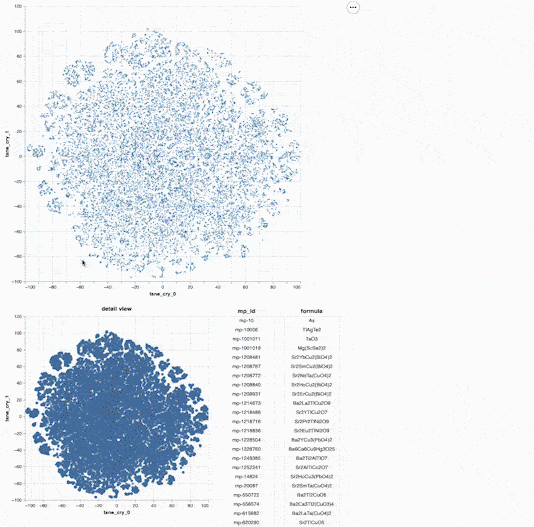This is the offitial imprementation of Self-supervised learning of materials concepts from crystal structures via deep neural networks.
We named this approach as CMML: Contrastive Materials Metric Learning
- PyTorch implementation of proposed method
- Please see
src/directory.
- Interactive materials map visualisation

- Resulting embeddings with a Jupyter notebook for local neighbourhood analysis
- Local neighbourhood search results
- List of the target materials from the Materials Project
- Citation
- Corresponding to the results of the "Global distribution analysis" section in the main text.
- You can interactively explore our materials map on your web browser.
Click to open:
➡️ Full map (pretty heavy: ~20MB)
➡️ Reduced map (randomly sampled to 20%)
-
Example of exporting embeddings with your data (.CIF files) and ploting in our materials map.
-
examples/export_embedding_from_CIF.ipynb:
➡️ Open in Google Colab
-
Corresponding to the results of the "Local neighbourhood analysis" section in the main text and Appendix A in the Supplementary Information (SI).
-
You can analyse our embeddings through the local neighbour search on your web browser.
-
examples/neighbour_analysis_of_MP.ipynb:
➡️ Open in Google Colab
- Corresponding to the results of the "Local neighbourhood analysis" section in the main text and Appendix A in the SI.
- You can see the extended lists of the top-1000 neighbourhoods for Tables and SI Tables shown below.
| Table | Method |
|---|---|
| Table 1 (Hg-1223) | Ours, ESM, SCM |
| Table 2 (LiCoO2) | Ours, ESM, SCM |
| SI Table S1 (Cr2Ge2Te6) | Ours, ESM, SCM |
| SI Table S2 (Sm2Co17) | Ours, ESM, SCM |
| SI Table S3 (Hg-1223) | Ours, Crystal structure encoder, XRD encoder |
| SI Table S4 (LiCoO2) | Ours, Crystal structure encoder, XRD encoder |
- The full list of the 122,543 target materials used in this study is available: metadata.csv
- You can collect the materials data using the shown Materials Project IDs via the Materials Project APIs.
@article{Suzuki_materials_concepts_learning_2022,
doi = {10.1088/2632-2153/aca23d},
url = {https://dx.doi.org/10.1088/2632-2153/aca23d},
year = {2022},
month = {dec},
publisher = {IOP Publishing},
volume = {3},
number = {4},
pages = {045034},
author = {Yuta Suzuki and Tatsunori Taniai and Kotaro Saito and Yoshitaka Ushiku and Kanta Ono},
title = {Self-supervised learning of materials concepts from crystal structures via deep neural networks},
journal = {Machine Learning: Science and Technology},
}
